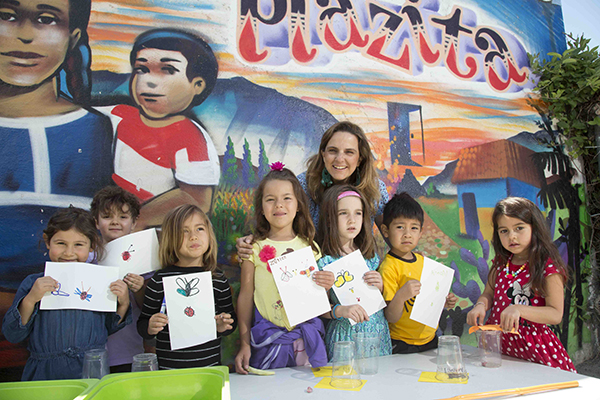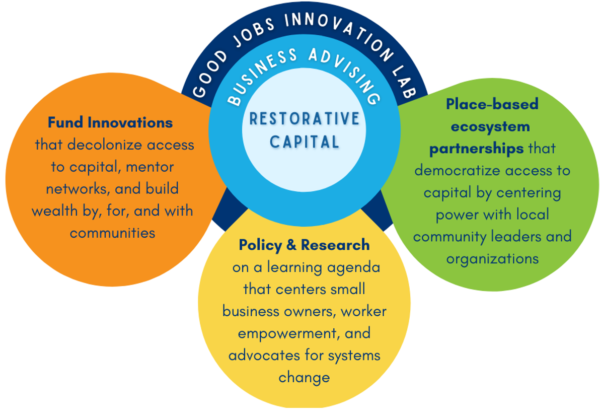Childcare – and the struggles of daycare owners to stay open, daycare workers to get the pay and benefits they deserve, and working parents to afford the cost of childcare with no help from the Federal government – has come to define the last two years. La Plazita preschool in Oakland is a true Spanish Immersion preschool where kids learn or retain Spanish, and also become fully prepared for Kindergarten. In the years before COVID, La Plazita’s first location quickly became successful, and when it came time to expand to a second location with a more direct community focus in Fruitvale, owner Krystell Guzman came to PCV for guidance. She eventually opened two more locations, employing 38 people and offering healthcare and retirement benefits. But as COVID hit and dragged on, Krystell found her success, front-line small business needed capital and banks were unwilling to help.
There are hundreds of thousands of stories like Krystell’s, and at Pacific Community Ventures, the CDFI that I lead, we refuse to accept this. In November of 2021 we launched our Oakland Restorative Loan Fund – $2.5 million in no fee, zero-interest small business loans. We built this zero-interest fund because that’s what small business owners in our majority BIPOC community told us they needed – and when we launched it, we heard some surprising pushback from other community investors: Doing this fund is fundamental to our mission of decolonizing. We heard from some fellow community investors that this was distorting the market, or making them look bad. They called people like Krystell “acceptable losses.” We refuse to accept acceptable losses.

Krystell applied for an Oakland Restorative Loan Fund loan and received it in January of this year. She told us she intends to use the loan to stabilize her company after a very challenging year where many parents opted to keep their children home. They had to close for 2 months and then they returned only 5% of their kids came back right away. Now that they’ve built back, se says she’s using the zero-interest loan “to continue growing the schools, maintaining the jobs that we have, and providing better wages to our employees.”
Why is PCV centering so much of what we do around Black, Indigenous, Latinx, and AAPI entrepreneurs if our mission is to create a just economy and good jobs with dignity for working people? People of color start more businesses each year than anyone else, led by Black women and Latinx women, and in 2021 communities of color saw the largest surge in new businesses in decades. Combine that with the fact that 99% of American businesses are small – and small businesses employ half of American workers – and you have your answer.
Decolonizing Capital: A Crucial Step Towards Racial & Economic Justice
PCV was one of America’s first impact investors, and CDFIs like us were created out of the Civil Right movement – that’s why we’re going back to our core values as we launch a new strategy to take PCV into the future. How do we define impact investing? Two things make it different from traditional investing: intent – does it impact the problem you’re looking to fight – and measurement – are you making certain your investment accomplishes that goal? PCV is embedding this into every single thing we do. That’s impact-first investing.
Our mantra has been “Decolonize, Democratize, Restore”. What does that mean to us? Decolonize is breaking from the ways of doing business that we inherited from the traditional financial system and centering people of color and underestimated communities as CDFIs were meant to from our civil rights roots. Democratize is listening to our entrepreneurs and community leaders and partnering with them to design and innovate, share power, share resources, and build the services they need, in the way they need it. Restore is meeting them where they are, and acting in restorative, not extractive, ways.
In 2020 we took our first steps on this new journey, which started with a hard look in the mirror. In order to walk the talk, we had to work on ourselves. We:
- Established a committee to train staff in DEI and anti-racism, and identify ways to improve DEI across our business lines.
- Launched biweekly all-staff discussions facilitated by our DEI team around topics related to systemic racism, to advance anti-racism in our workplace and activities.
- Introduced small business owner stories into team meetings to cultivate empathy with those we serve, and started quarterly external “Listening Sessions with the CEO” to hear from them directly.
- Revamped our hiring, including removing identifying details (names, education, etc.) from materials submitted by job seekers, expanding where we post job openings, and audio-only interviewing as late into the process as possible.
- Started a Professional Development Program, with cohorts for Directors, Managers, Analysts to actively build more leadership skills and competencies across the org.
- Hired a DEI firm to support our anti-racist culture development, HR practices, and make recommendations across our business lines.
- We also added 3 new board members, prioritizing candidates with lived and direct experience investing in diverse entrepreneurs, as well as women of color in finance, creating PCV’s first majority-BIPOC board.
Evaluating our lending portfolio through the first year of the COVID crisis caused us to realize that we had barely 1% in write-offs (less than the 1.3% average loan loss rate of U.S. banks in 2020). PCV had already changed the way we deployed our lending over the last few years, because lending to bank or SBA guidelines largely excluded Black-owned businesses. From there we’ve been working at the national level on reconceiving how we as CDFIs define “risk” as an industry, to meet our mission of investing in under-estimated people and places.
Through COVID we doubled the size of our small business lending portfolio — and deployed over 76% of our capital to entrepreneurs of color and women across the State of California, with 85% invested in economically distressed communities. Our portfolio’s performance does more than prove that you can invest in historically underestimated entrepreneurs and communities without compromising financial viability. Our performance demonstrates investing in the underestimated isn’t a “risky” investment, it is an exceptional investment opportunity for generating financial growth while achieving socio-economic justice in this country.
The Next Phase Of PCV’s Evolution
Too few community investors are building products and services based on what actual business owners tell them they need, and how they need them. We need to take this opportunity to break with the past and create systems that meet business owners of color where they are – and that’s exactly what we’re committed to as we rebirth our organization around restorative capital that empowers small businesses and creates good jobs with dignity in communities across the country.

As we combat a constantly changing economy and system, it is crucial that our work be adaptable and rooted in learning, research, and experimentation. This is where our Good Jobs Innovation Lab comes in. While our Small Business Lending and Advising programs will continue to connect entrepreneurs to accessible expertise and restorative capital, the Good Jobs Innovation Lab will establish a regular process of research and experimentation to ensure that our programs grow with and actively impact our communities’ changing needs, empowering workers alongside business owners.
For CDFIs to manifest the intentions set out by Civil Rights leaders to serve both racial and economic justice, we cannot be siloed from one another. We must work together to create lasting systemic change, impactful thought leadership and transformative policy. While PCV’s day-to-day work centers on our small business clients, our Good Jobs Innovation Lab elevates that work and advances CDFIs and impact investors everywhere. We work with, and for, the community, and change everything we can control with our own programs, services, and hiring. We work closely with our investors and funders to ensure that capital and support comes to us in ways that allow us to be restorative. That only goes so far. Our advocacy allows us to amplify the voices of entrepreneurs, workers, and communities whom the government and private sector have failed, and continue to fail, for broader systems change – to make the rules of the game more fair, affordable, accessible for all.
In 2022, as we launch our new strategy, PCV is going deeper into place-based community-led and designed ecosystem approaches across California, starting with our hometown in Oakland. We will also partner more deeply with community organizations and other CDFIs across the nation through our pro bono Business Advising program. Our advising will match the diversity and lived experience of the entrepreneurs and communities we serve, and support both business growth and worker empowerment, towards our goals of helping business owners like Krystell be agents of change in their communities and catalyze racial and community wealth.
Join Us
Join us. If you believe in an economy centered in racial and economic justice, contact us here to fund PCV with the 0%-2% capital and grants we need to deliver our work. You can learn more about partnering with us here, enrolling as a pro bono business advisor here, and if you’re an entrepreneur looking for free advice or truly affordable capital, you can learn more here.